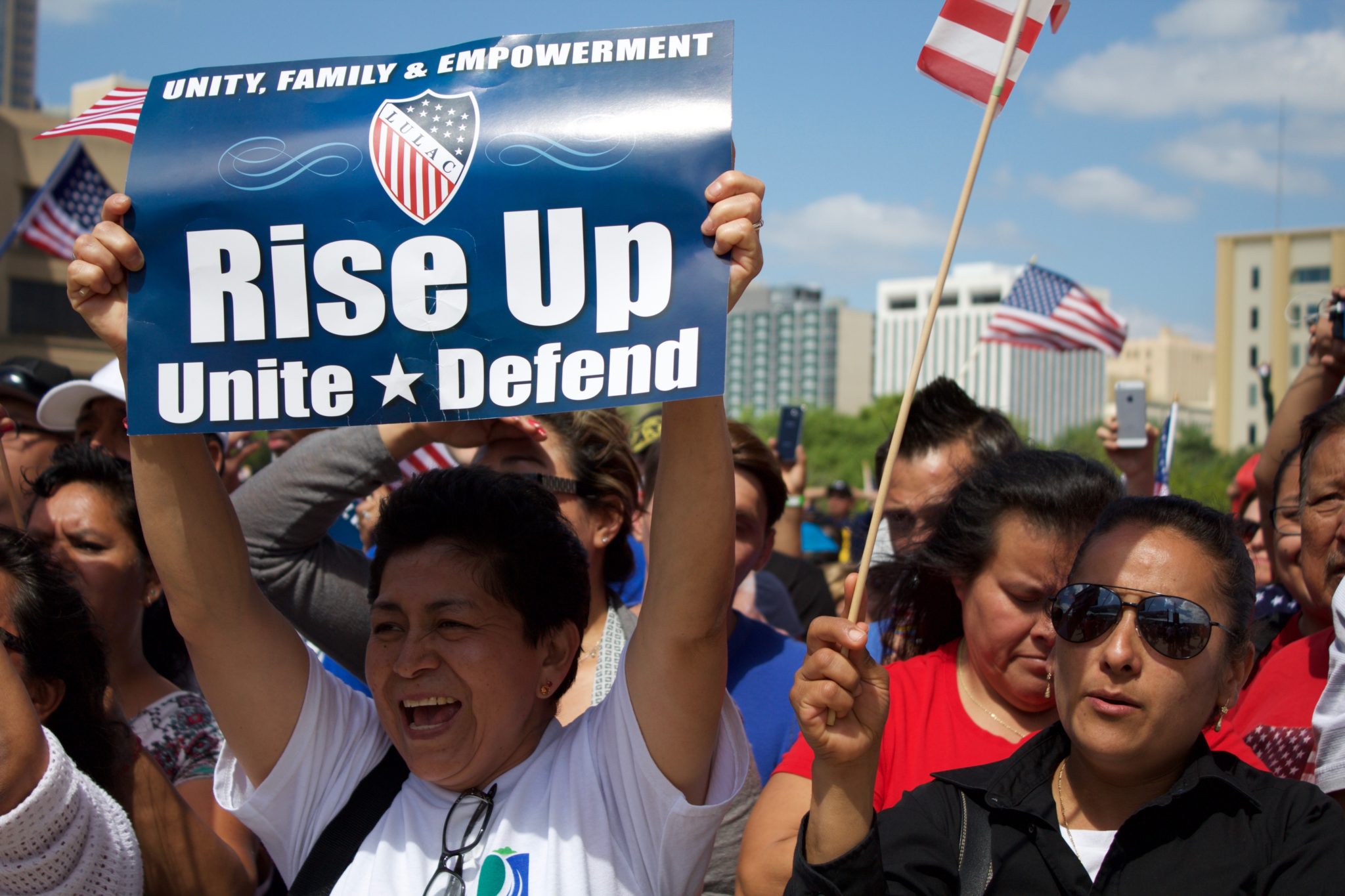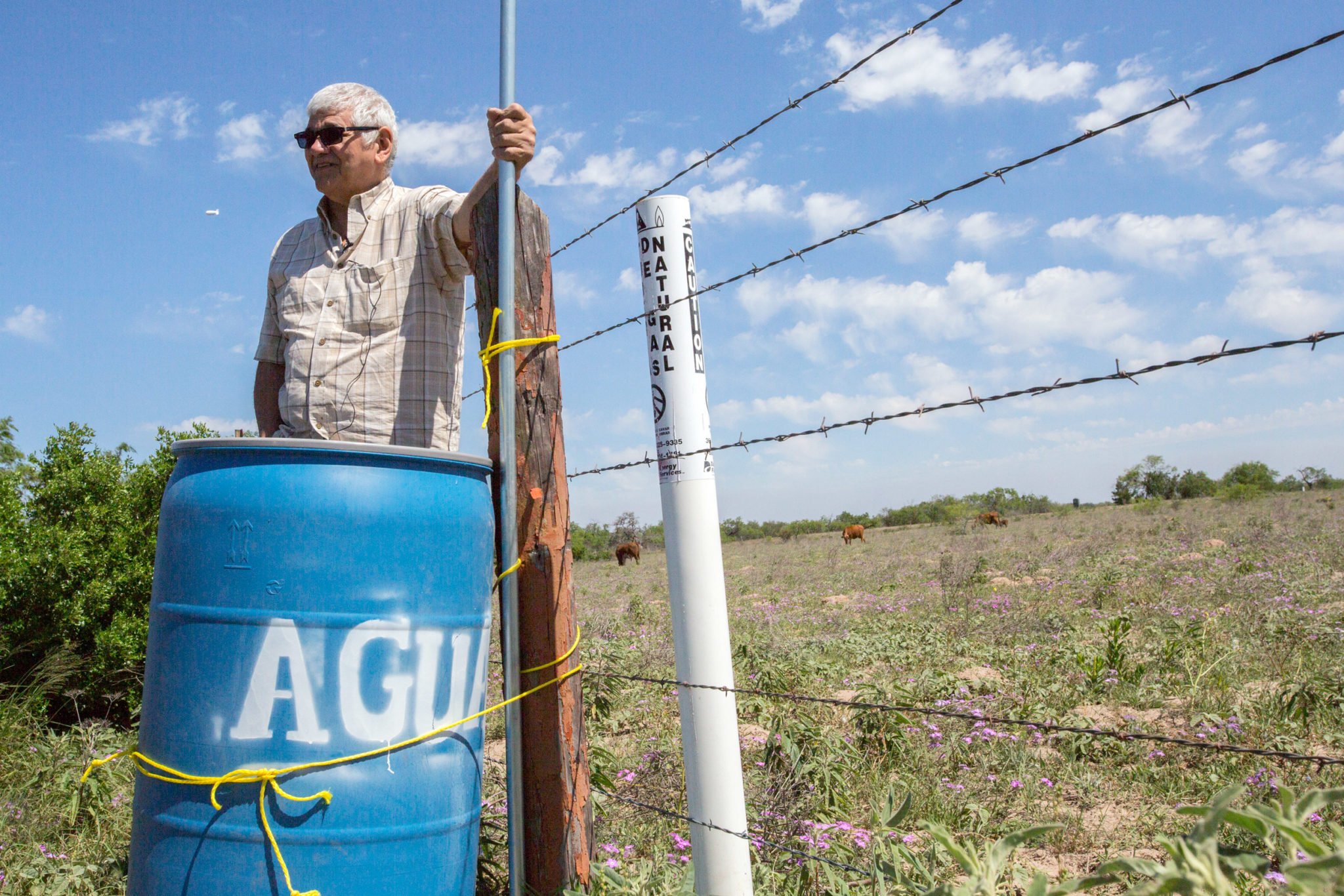
Bordering on Cowardice
From Joe Biden to Colin Allred, Democrats are flip-flopping on an issue at the heart of the American experiment.

A version of this story ran in the May / June 2024 issue.
In an otherwise strong State of the Union address this March, President Joe Biden breathed new life into a term the immigrant rights movement has spent years pushing out of the Democratic vocabulary. He was stumbling over a sentence; right-wing Congresswoman Marjorie Taylor Greene was heckling him from the audience about a young woman in Georgia who’d allegedly been killed the month prior by a non-U.S. citizen. Apparently parroting Greene, Biden confirmed that the woman, Laken Riley, had been killed “by an illegal.”
Backlash was swift from pro-immigrant Congress members and advocates who’ve long fought for the idea that “No human being is illegal.” (For what it’s worth, the alleged killer had reportedly been released into the country through a stopgap parole mechanism.) “The rhetoric President Biden used tonight was dangerously close to language from Donald Trump that puts a target on the backs of Latinos everywhere,” warned San Antonio Congressman Joaquin Castro.
The president went on television two days later to acknowledge he should have used a more respectful word like “undocumented,” describing such rhetorical choices as a “difference between Trump and [him].” Asked point-blank if he regretted his wording, he said yes. But—after Biden’s apparent apology was mocked by Trump and the GOP U.S. House speaker—a White House spokesperson insisted at a press briefing, “The president absolutely did not apologize.”
At best, Biden’s use of a retrograde xenophobic insult could have occasioned a sincere apology and a forceful insistence on the basic fact that undocumented immigrants are less likely to commit crimes than the native-born. But the president’s PR shop felt it more important to (unsuccessfully) avoid looking soft on unauthorized immigration. This decision was but a minor example of Biden’s overall reelection strategy of shifting right on immigration to try to neutralize his opponent’s top issue.
The real crisis is that we are perilously close to abandoning the dream of bringing our neighbors “out of the shadows.”
It’s all a far cry from 2020, when Democrats had polarized leftward on immigration and then-candidate Biden spoke boldly of restoring “our historic role as a safe haven for refugees and asylum-seekers” and called migrants “an irrefutable source of our strength.” On taking office, Biden paused deportations and submitted to Congress a desperately needed reform proposal including increased visas and a path to legalization for the nation’s 11 million undocumented residents. But, despite campaign pledges, he never threw his weight behind the bill. Eventually, as the pandemic waned worldwide, arrivals at the U.S.-Mexico border increased, GOP fear-mongering accelerated, and polling showed the public somewhat reverting to nativist alarmism. With reelection looming, Democrats began throwing 2020 positions overboard, retreating to more hawkish views common in the party pre-Trump.
Early this year, Biden spied a political opening. He caved to a GOP congressional ploy to pair unrelated foreign aid with a border crackdown, embracing a bipartisan Senate bill over strenuous objections from Latino Democratic senators. The bill would have profoundly undermined asylum law by granting the president a convoluted new power to shut down the border, while generally raising the bar for securing asylum. Unlike previous attempts at “comprehensive immigration reform,” the measure did not even offer citizenship to the so-called Dreamers—immigrants brought as children who’ve often known no other home. “Democrats have really ceded a lot of ground to the Republican position,” one advocate told Al Jazeera in February.
To the seeming delight of Biden world, Republicans ultimately killed the bill, giving the president a talking point he’s since treated like a rented mule: It is the GOP, in fact, who won’t secure the border. As Politico reported in March, “The president’s team believes [it’s been able] to neutralize the political backlash Biden was facing and even reap some benefits in the polls.”
This cynical gambit may or may not work. It will be difficult to steal Trump’s border-crackdown thunder, but Biden probably sees a no-lose situation because pro-immigrant voters have nowhere else to go. If reelected, Trump would likely hand the immigration keys to his top nativist advisor Stephen Miller, who’s been planning what he calls “the most spectacular migration crackdown.” Meanwhile, Dems are letting robust pro-immigrant arguments go to rust and possibly undermining long-term chances for enduring reform.
Take, for example, Dallas Democratic Congressman Colin Allred, now running to unseat GOP Senator Ted Cruz. Allred has vaulted atop the border-hawk bandwagon, signing on to a misleading Republican-led House resolution in January denouncing Biden’s “open-borders policies.” Last fall, he went so far as to praise Biden’s decision to build 20 miles of noncontiguous border wall in South Texas’ Starr County, a move that the president himself described as pointless but out of his hands to stop.
It’s sad enough for a Texas politician to promote the forced taking of Texans’ private property to build pointless bits of wall, but Allred’s move was also politically hackish. In 2018, he’d called the border wall “racist” and said his generation would “tear it down”—comments the Cruz campaign has predictably used to call out Allred’s “cowardly flip-flopping strategy.”
Meanwhile, Democratic mayors in the North have made matters worse. Starting in 2022, Texas Governor Greg Abbott began busing migrants to out-of-state blue cities, a gambit to troll so-called sanctuary cities. Fearing local backlash, these panicked mayors have played into Abbott’s hands, with Eric Adams even claiming the arrivals would “destroy New York City.”
There are, of course, some bright spots within the Democratic Party, including Latino Congress members from Texas’ big cities: San Antonio’s Castro, El Paso’s Veronica Escobar, Greg Casar of Austin, and Sylvia Garcia in Houston.
But the overall debate has devolved to the point that some Dems could stand to crib a few lines from Texas Republicans of yore. Contradictory policies notwithstanding, George W. Bush described the undocumented in 2006 as “decent people who work hard, support their families, practice their faith, and lead responsible lives,” and Rick Perry said of Dreamers in 2001: “We don’t care where you come from, but where you are going, and we are going to do everything we can to help you get there.”
Yes, Trump killed that strain of Republican politics. But Trump is also one of history’s small men. The question of human freedom of movement is enormous and will outlast this man who presently warps our nation’s moral compass.

We live in an era of mass migration fueled by war, climate change, and post-pandemic economic crisis, along with ease of international travel and communication. Long past 2024, America’s leaders will face a fundamental dilemma: Deterring migrants from seeking U.S. safety and prosperity requires measures that are cruel, expensive, and possibly illegal under international law. Outsourcing our border enforcement to Mexico, as Biden has begun attempting, may seem to work for a time but is amoral and unsustainable. Moving beyond the model of deterrence is the true challenge, and liberal leaders should be wedded to that cause.
The federal asylum process—just one small corner of the immigration system—is indeed outdated, but the odds of Congress justly reforming it while today’s Republicans control the House are nil. And to risk gutting it without even legalizing the undocumented is ethical negligence. Our leaders need not always tail our worst instincts but may call us to our best. Any Texan, in particular, can cast propaganda aside and simply look around to see that our state is built, maintained, and improved every day by unauthorized workers. These same laborers send money back home, transforming their families’ lives, in quantities that make a laughingstock of any foreign aid program the United States even contemplates.
The real crisis is that we are perilously close to abandoning the dream of bringing our neighbors “out of the shadows.” It is that what good steps Biden has taken on immigration—through executive action—can be immediately undone by a reelected Trump. It is that we could be demagogued into losing one of the things that makes this country, born of indelible sin, worth a damn: our fragile yet tenacious understanding that we are a nation of immigrants.



